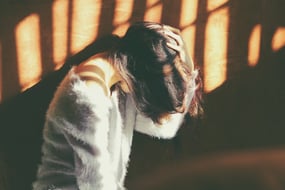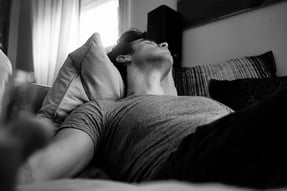Blog
- snoring (27)
- apnoea (20)
- sleep study (10)
- apnea (9)
- CPAP (7)
- Sleep studies (7)
- weight gain (6)
- sleep deprivation (5)
- sleep disorders (5)
- surgery for apnoea (5)
- diabetes (4)
- sleep apnoea (4)
- OAT (3)
- OSA (3)
- Pregnancy (3)
- Snore (3)
- children (3)
- heart disease (3)
- hypertension (3)
- in home sleep studies (3)
- obesity (3)
- polysomnogram (3)
- surgery for apnea (3)
- ADHD (2)
- Alzheimers (2)
- CPAP treatment (2)
- Gladstone CPAP (2)
- PSG (2)
- UPPP (2)
- apnea pregnancy (2)
- apnoea pregnancy (2)
- apnoea surgery (2)
- blood pressure (2)
- cognitive impairment (2)
- cpap supplies brisbane (2)
- cpap therapy (2)
- dementia (2)
- dental treatment for apnoea (2)
- dental treatment for snoring (2)
- diabetic peripheral neuropathy (2)
- driving (2)
- holiday (2)
- in home sleep study (2)
- kids (2)
- menopause (2)
- obstructive sleep apnoea (2)
- oral appliance therapy (2)
- sleep (2)
- sleep apnoea and weight (2)
- sleep apnoea study (2)
- sleep apnoea women (2)
- sleep clinics (2)
- sleep disordered breathing (2)
- sleeping tips (2)
- type 2 diabetes (2)
- Apnea Winter (1)
- Apnoea Winter (1)
- Apnoea and heart disease (1)
- Brisbane sleep study (1)
- CPAP Supplies (1)
- CPAP effectiveness (1)
- CPAP success rate (1)
- Christmas (1)
- Coal Board Medical (1)
- Coal Board Medicals (1)
- Depression (1)
- Emerald sleep clinic (1)
- Festive Season (1)
- Frequent Urination (1)
- Gladstone sleep study (1)
- Gladtone sleep studies (1)
- IQ (1)
- Nocturia (1)
- Nocturia Causes (1)
- OSA and obesity (1)
- Obstructive Sleep Apnoea and Cancer (1)
- Patient feedback on CPAP (1)
- SDB (1)
- Sleep Apnoea Treatment Leads To Cost Savings (1)
- Sleep and Depression (1)
- Sleep and pain (1)
- Sleep-related Breathing Disorder treatment (1)
- Sleeping on a plane (1)
- UARS (1)
- Upper Airway Resistance Syndrome (1)
- accupressure (1)
- accupressure treatment for snoring (1)
- alarm (1)
- alzheimers disease (1)
- anti snoring (1)
- apnea and cancer (1)
- apnea cognitive impairment (1)
- apnea dementia (1)
- apnea depression (1)
- apnea diabetes obesity cancer (1)
- apnea surgery (1)
- apnea treatment (1)
- apnoea cognitive impairment (1)
- apnoea dementia (1)
- apnoea depression (1)
- apnoea diabetes obesity cancer (1)
- apnoea diagnosis regional qld (1)
- apnoea diagnosis regional queensland (1)
- apnoea government funding (1)
- apnoea in children (1)
- apnoea in women (1)
- apnoea treatment (1)
- apnoea treatment regional qld (1)
- apnoea treatment regional queensland (1)
- bad sleeping habits (1)
- belly fat (1)
- benefits of home sleep study (1)
- best treatment (1)
- best treatment for apnoea (1)
- best treatment for snoring (1)
- blue light (1)
- bmi (1)
- brain (1)
- brain activity while sleeping (1)
- brain damage (1)
- breast cancer (1)
- brisbane cpap (1)
- brisbane cpap supplies (1)
- brisbane home based sleep study (1)
- can't sleep (1)
- cancer (1)
- cancer and apnea (1)
- cardio metabolic disease (1)
- catch a cold (1)
- childhood apnoea (1)
- children snoring (1)
- cleaning cpap machine (1)
- cold (1)
- compression bandages (1)
- consequences of snoring (1)
- cpap 2018 (1)
- cpap and sexual function (1)
- cpap brisbane (1)
- cpap cleaning (1)
- cpap diabetes sight (1)
- cpap diabetic retinopathy (1)
- cpap diabetic sight (1)
- cpap gladstone (1)
- cpap machine (1)
- cpap mask (1)
- cpap masks (1)
- cpap problems and solution (1)
- cpap risks (1)
- cpap supplies gladstone (1)
- cpap supplies qld (1)
- cpap supplies queensland (1)
- cpap treatment forever (1)
- cpap tubing (1)
- customer feedback (1)
- danger (1)
- diagnostic sleep study (1)
- dissatisfaction with UPPP (1)
- do I need a sleep study (1)
- driver fatigue queensland (1)
- effects of oversleeping (1)
- effects of sleep disorders on teenagers and childr (1)
- employment (1)
- exercise (1)
- exercise helps snoring (1)
- facebook apnoea (1)
- facebook snoring (1)
- fail (1)
- female apnoea (1)
- female sleep apnea (1)
- female sleep apnoea (1)
- female snoring (1)
- fertility (1)
- funding apnoea research (1)
- gender difference (1)
- genes (1)
- genetics (1)
- getting a sleep study in Brisbane (1)
- gladstone cpap supplies (1)
- gladstone home based sleep study (1)
- guided sleep meditation (1)
- health facts (1)
- help me sleep (1)
- hereditary (1)
- hidden epidemic (1)
- high blood pressure (1)
- hitting snooze (1)
- home based preferred (1)
- home based recommended (1)
- home based sleep study brisbane (1)
- home based sleep study gladstone (1)
- home sleep study (1)
- how to correct sleep disorders (1)
- how to fall asleep faster (1)
- how to stay awake (1)
- humidifier (1)
- impact of snoring (1)
- impaired judgement (1)
- insomnia (1)
- insomnia causes (1)
- kid sleeping tips (1)
- lack of sleep (1)
- loud snoring (1)
- memory (1)
- misdiagnosis (1)
- muscle pain (1)
- myths (1)
- natural solution (1)
- neck circumference (1)
- neck size (1)
- new year (1)
- obesity and sleep (1)
- obstructive sleep apnea (1)
- oh&s (1)
- overindulgence (1)
- oversleeping (1)
- oversleeping side effects (1)
- pinkie ring (1)
- poor sleep (1)
- preeclampsia (1)
- prevalence (1)
- problems with dental treatments for sleep disorder (1)
- problems with oat (1)
- psychology (1)
- queensland regional sleep clinic (1)
- queensland regional sleep clinics (1)
- queensland sleep studies (1)
- recover (1)
- regional sleep clinic (1)
- regional sleep clinics (1)
- regional sleep studies (1)
- relationships (1)
- research (1)
- resolution (1)
- separate rooms (1)
- severe sleep apnoea (1)
- sex (1)
- side effects of snoring (1)
- skipping cpap (1)
- sleep affects learning (1)
- sleep and cancer (1)
- sleep and obesity (1)
- sleep apnea (1)
- sleep apnea and alzheimer (1)
- sleep apnea and health (1)
- sleep apnea and ischemic heart disease (1)
- sleep apnea and stroke (1)
- sleep apnea cancer (1)
- sleep apnea causes (1)
- sleep apnea clinic CBD brisbane (1)
- sleep apnea prevention (1)
- sleep apnea studies (1)
- sleep apnea study (1)
- sleep apnea symptoms (1)
- sleep apnea teenagers (1)
- sleep apnea what is it (1)
- sleep apnea women (1)
- sleep apnoea and ischaemic heart disease (1)
- sleep apnoea and stroke (1)
- sleep apnoea and weight gain (1)
- sleep apnoea and weight loss (1)
- sleep apnoea brain damage (1)
- sleep apnoea cancer (1)
- sleep apnoea female (1)
- sleep apnoea studies (1)
- sleep apnoea symptoms (1)
- sleep apnoea teenagers (1)
- sleep apnoea treatment (1)
- sleep clinics gladstone (1)
- sleep depression (1)
- sleep deprived (1)
- sleep disorder (1)
- sleep disorder signs (1)
- sleep disorder symptoms (1)
- sleep drunkenness (1)
- sleep duration (1)
- sleep meditation (1)
- sleep myth (1)
- sleep paralysis (1)
- sleep problem (1)
- sleep studies bariatric surgery (1)
- sleep study Brisbane (1)
- sleep tracker watch (1)
- sleep watch (1)
- sleeping habits (1)
- sleepless (1)
- sleepstyle (1)
- smartwatch (1)
- smartwatch sleep (1)
- smoking (1)
- snooze (1)
- snooze button (1)
- snooze health effects (1)
- snore cure (1)
- snorer (1)
- snoring cure (1)
- snoring cures (1)
- snoring depression (1)
- snoring facts (1)
- snoring pregnancy (1)
- snoring problem (1)
- snoring problems (1)
- snoring solution (1)
- snoring statistics (1)
- snoring tips (1)
- socks (1)
- stigma (1)
- stockings (1)
- stop snoring (1)
- stress (1)
- stroke (1)
- success (1)
- success rate of cpap machines (1)
- surgical treatment apnoea (1)
- surgical treatment for sleep apnoea (1)
- surviving stress (1)
- symptoms of sleep apnea (1)
- symptoms of sleep apnoea (1)
- technology (1)
- teenage sleep disorders (1)
- teenager (1)
- testimonial (1)
- tips on snoring (1)
- travelling (1)
- treatment for apnea (1)
- treatment for apnoea (1)
- truck driver sleep (1)
- truck drivers (1)
- truck drivers apnea (1)
- truck driving (1)
- use cpap with a cold (1)
- using cpap (1)
- weight (1)
- what happens when you sleep (1)
- what is sleep apnea (1)
- why do we sleep (1)
- women (1)
- women apnoea (1)
- women sleep apnea (1)
- women sleep apnoea (1)
- women snoring (1)
- work (1)
Sleep Disorders: Top Easy Detectable Symptoms
 Are you waking up a lot during the night? Have you experienced snoring, sleepwalking or even sleep talking?
Are you waking up a lot during the night? Have you experienced snoring, sleepwalking or even sleep talking?
News flash: You may be suffering from a sleep disorder without you even knowing it.
As of today, more than 1.5 million Australian adults are now suffering from sleep disorders and it’s time to do something about it.
You may not know but sleep disorders can have a damaging impact on your health, on your relationships and even on your work.
The worst case scenario is you having diabetes, obesity, heart disease, stroke, clinical hypertension, impotence, depression, and numerous other conditions because of your sleeping disorders.
Diagnosing sleep disorders can be quite difficult. However, the following are some simple signs of sleep disorder that you can recognise in yourself or even your partner before you consult your doctor:
Snoring
If you or your partner snores loudly enough to wake yourself up, it’s time to go to your doctor.
Almost one-half of people who snore loudly have been diagnosed with obstructive sleep apnea. Matter of fact, snoring is one of the most common symptoms of sleep apnoea.
In more severe sleeping disorder cases like obstructive sleep apnoea, the sufferer stops breathing while they’re sleeping. Their sleep quality is severely reduced as well as their blood oxygen levels.
If you’re experiencing symptoms like this, you should consider having a sleep study.
Waking Regularly
If you find yourself wide awake at least 3 times during the night during the night, it’s not something that you should ignore.
Waking regularly can be the effect of having a stressful day at work, family problems or any stressful situation that’s going on in your life.
But if that’s not the case, it might be a sign of having sleep disorders like the overproduction of melatonin, clinical insomnia, and sleep apnoea.
 Can’t fall asleep
Can’t fall asleep
We all have those days when we’re lying in bed thinking about so many things while staring at the ceiling as the hour's tick by.
But did you know that having difficulty with sleeping can also be caused by other sleeping disorders?
It may be because of melatonin deficiency, where there isn’t enough melatonin in your system, therefore causing you to not being able to sleep.
If you find yourself worrying about not being able to get to sleep for a long time, it’s time to seek medical advice.
Restlessness
If you find yourself tossing and turning in bed, it can be a sign Restless Leg Syndrome (RLS) or Periodic Limb Movement Disorder (PLMD).
RLS is a condition where there’s an irresistible urge to move your legs at night and it can last for years or your whole lifetime. You can easily mistake it as a strange cramp or crawling sensation in your calves.
While PLMD is a disorder where you move your limbs involuntarily every 20-40 seconds while you sleep.
If you’re feeling these symptoms, you can try alternating hot and cold compresses, taking a hot bath or massaging your muscles can help ease the pain that you’re feeling.
But if the pain is getting harder to handle you need to see your doctor for a medical diagnosis.
Waking Tired
Admit it, we’ve all had mornings where we wake up feeling tired.
We’ve all had those days but is if you’re waking up without feeling refreshed consistently, you might be suffering from a sleep disorder.
Waking up feeling tired all the time means you’re not getting the rejuvenating periods of sleep that everyone else experiences.
It can be caused by sleep disorders like sleep apnea, PLMD and any various forms of clinical insomnia.
If you’re unsure what’s causing your consistent tiredness, consider having a sleep study to track what’s going on.
Sleep-Talking or Sleepwalking
If you’re sleepwalking at night and doing more than just walking a few steps around your room, you might need to consider consulting a sleep specialist.
Sleep-talking and sleepwalking is a symptom of REM Sleep Behavior Disorder (RBD), it can be a sign of your body acting out your dreams while you sleep.
Talk to your doctor if you find yourself excessively sleep-talking and sleepwalking at night because the results can be very dangerous to you and to those around you.
 Daytime sleepiness
Daytime sleepiness
Feeling sleepy during the day is a common thing if you’re working late, partying or binge-watching last night.
But if you find yourself going to bed, feeling sleepy during the day, while driving, while at work, during a meal, you may have Excessive Daytime Sleepiness (EDS).
If you’re experiencing EDS, it can be characterized by ongoing sleepiness and lack of energy.
EDS can be a condition that includes several sleep disorders like narcolepsy, sleep apnoea or a circadian rhythm sleep disorder.
If you or your partner have any of these symptoms, it’s important to seek medical advice or have an in-home sleep study.
Sleeping is not a luxury that we can’t afford, it’s an essential that we must have. It’s time to start improving your sleep health not only for yourself but also to those around you. Start by taking our free Sleep Self Assessment Questionnaire today.
